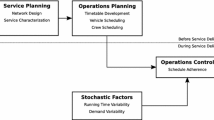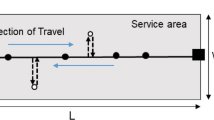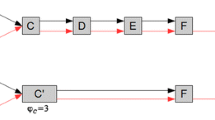Abstract
A rapid transit system is called robust if it maintains its functionality under perturbations. To be robust, strategies for producing less vulnerable plans and procedures of recovery actions in case of disruptions (including timetable adjustment, rolling stock re-scheduling and crew re-scheduling) are used. This paper deals with the first task and develops an effective plan for allocating fleet frequencies at stops along a line based on three objectives: minimizing passenger overload, maximizing passenger mobility and minimizing passenger loss. Schedules for decongesting and recovering the line are determined by means of optimization models. Heuristic approaches are discussed and computational results for a real case study are provided.
Preview
Unable to display preview. Download preview PDF.
Similar content being viewed by others
References
Barra, A., Carvalho, L., Teypaz, N., Cung, V.D., Balassiano, R.: Solving the Transit Network Design Problem with Constraint Programming. In: Proceedings of the 11th World Conference in Transport Research, University of California, Berkeley, USA, June 24-28 (2007)
Ceder, A., Wilson, N.H.M.: Bus Network Design. Transportation Research B 20, 331–334 (1986)
Ceder, A., Stern, H.I.: Deficit Function Bus Scheduling with Deadheading Trip Insertion for Fleet Size Reduction. Transportation Science 15(4), 338–363 (1981)
Eberlein, X.J., Wilson, N.H.M., Barnhart, C.: The Real Time Deadheading Problem. Transportation Research B 32, 77–100 (1997)
Ehrgott, M., Gandibleu, X.: Approximative Solution Methods for Multiobjective Combinatorial Optimization. TOP 12(1), 1–89 (2004)
Furth, P.G.: Short Turning on Transit Routes. Transportation Research Record 1108, 42–52 (1987)
Glover, F.W., Kochemberger, G.A.: Handbook of Metaheuristics. Springer, Heidelberg (2003)
Guihaire, V., Hao, J.-K.: Transit Network Design and Scheduling: A Global Review. Transport. Res. Part A. 42, 1251–1273 (2008)
Guentari, M.S., Codina, E.: Optimización de Frecuencias Combinadas y Asignación de Vehículos en Redes de Transporte Público Congestionadas. VIII Congreso de Ingeniería de Transporte, A Coruña, Spain (2008)
Israeli, Y., Ceder, A.: Transit Route Design Using Scheduling and Multiobjective Programming Techniques. In: Proceedings of the Sixth International Workshop on Computer Aided Scheduling of Public Transport, pp. 56–75. Springer, Heidelberg (1993)
Soeldner, D.W.: A Comparasion of Control Options on the MBTA green line. Master thesis, Civil Engineering, MIT (1993)
Tirachini, A., Cortés, C.E., Jara-Díaz, S.: Estrategia Integrada de Asignación de Flota en un Corredor de Transporte Público. XIII Congreso Chileno de Ingeniería de Transporte. Santiago, Chile (2007)
Wan, Q.K., Lo, H.K.: A Mixed Integer Formulation for Multiple-route Transit Network Design. Journal of Mathematical Modelling and Algorithms 2(4), 299–308 (2003)
Wilson, N.H.M., Macchi, R.A., Fellows, R.E., Deckoff, A.A.: Improving Service on the MBTA Green Line through Better Operations Control. Transportation Research Record 1361 (1992)
Author information
Authors and Affiliations
Editor information
Editors and Affiliations
Rights and permissions
Copyright information
© 2009 Springer-Verlag Berlin Heidelberg
About this chapter
Cite this chapter
Mesa, J.A., Ortega, F.A., Pozo, M.A. (2009). Effective Allocation of Fleet Frequencies by Reducing Intermediate Stops and Short Turning in Transit Systems. In: Ahuja, R.K., Möhring, R.H., Zaroliagis, C.D. (eds) Robust and Online Large-Scale Optimization. Lecture Notes in Computer Science, vol 5868. Springer, Berlin, Heidelberg. https://doi.org/10.1007/978-3-642-05465-5_12
Download citation
DOI: https://doi.org/10.1007/978-3-642-05465-5_12
Publisher Name: Springer, Berlin, Heidelberg
Print ISBN: 978-3-642-05464-8
Online ISBN: 978-3-642-05465-5
eBook Packages: Computer ScienceComputer Science (R0)




